A randomized, placebo-controlled, clinical trial of high-dose supplementation with vitamins C and E, beta carotene, and zinc for age-related macular degeneration and vision loss: AREDS report no. 8
- PMID: 11594942
- PMCID: PMC1462955
- DOI: 10.1001/archopht.119.10.1417
A randomized, placebo-controlled, clinical trial of high-dose supplementation with vitamins C and E, beta carotene, and zinc for age-related macular degeneration and vision loss: AREDS report no. 8
Erratum in
- Arch Ophthalmol. 2008 Sep;126(9):1251
Abstract
Background: Observational and experimental data suggest that antioxidant and/or zinc supplements may delay progression of age-related macular degeneration (AMD) and vision loss.
Objective: To evaluate the effect of high-dose vitamins C and E, beta carotene, and zinc supplements on AMD progression and visual acuity.
Design: The Age-Related Eye Disease Study, an 11-center double-masked clinical trial, enrolled participants in an AMD trial if they had extensive small drusen, intermediate drusen, large drusen, noncentral geographic atrophy, or pigment abnormalities in 1 or both eyes, or advanced AMD or vision loss due to AMD in 1 eye. At least 1 eye had best-corrected visual acuity of 20/32 or better. Participants were randomly assigned to receive daily oral tablets containing: (1) antioxidants (vitamin C, 500 mg; vitamin E, 400 IU; and beta carotene, 15 mg); (2) zinc, 80 mg, as zinc oxide and copper, 2 mg, as cupric oxide; (3) antioxidants plus zinc; or (4) placebo.
Main outcome measures: (1) Photographic assessment of progression to or treatment for advanced AMD and (2) at least moderate visual acuity loss from baseline (> or =15 letters). Primary analyses used repeated-measures logistic regression with a significance level of.01, unadjusted for covariates. Serum level measurements, medical histories, and mortality rates were used for safety monitoring.
Results: Average follow-up of the 3640 enrolled study participants, aged 55-80 years, was 6.3 years, with 2.4% lost to follow-up. Comparison with placebo demonstrated a statistically significant odds reduction for the development of advanced AMD with antioxidants plus zinc (odds ratio [OR], 0.72; 99% confidence interval [CI], 0.52-0.98). The ORs for zinc alone and antioxidants alone are 0.75 (99% CI, 0.55-1.03) and 0.80 (99% CI, 0.59-1.09), respectively. Participants with extensive small drusen, nonextensive intermediate size drusen, or pigment abnormalities had only a 1.3% 5-year probability of progression to advanced AMD. Odds reduction estimates increased when these 1063 participants were excluded (antioxidants plus zinc: OR, 0.66; 99% CI, 0.47-0.91; zinc: OR, 0.71; 99% CI, 0.52-0.99; antioxidants: OR, 0.76; 99% CI, 0.55-1.05). Both zinc and antioxidants plus zinc significantly reduced the odds of developing advanced AMD in this higher-risk group. The only statistically significant reduction in rates of at least moderate visual acuity loss occurred in persons assigned to receive antioxidants plus zinc (OR, 0.73; 99% CI, 0.54-0.99). No statistically significant serious adverse effect was associated with any of the formulations.
Conclusions: Persons older than 55 years should have dilated eye examinations to determine their risk of developing advanced AMD. Those with extensive intermediate size drusen, at least 1 large druse, noncentral geographic atrophy in 1 or both eyes, or advanced AMD or vision loss due to AMD in 1 eye, and without contraindications such as smoking, should consider taking a supplement of antioxidants plus zinc such as that used in this study.
Figures



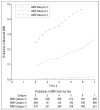
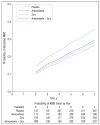
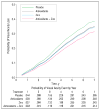
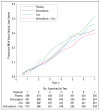
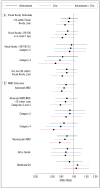
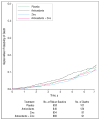
Comment in
-
Antioxidants, zinc, and age-related macular degeneration: results and recommendations.Arch Ophthalmol. 2001 Oct;119(10):1533-4. doi: 10.1001/archopht.119.10.1533. Arch Ophthalmol. 2001. PMID: 11594957 No abstract available.
-
AREDS investigators distort findings.Arch Ophthalmol. 2002 Jan;120(1):100-1. doi: 10.1001/archopht.120.1.100. Arch Ophthalmol. 2002. PMID: 11786071 No abstract available.
-
Can high-dose supplementation with vitamins C and E, beta carotene, and zinc slow the progression of macular degeneration?J Fam Pract. 2002 Feb;51(2):105. J Fam Pract. 2002. PMID: 11978202 No abstract available.
-
Age-related eye disease study caveats.Arch Ophthalmol. 2002 Jul;120(7):997; author reply 997-9. Arch Ophthalmol. 2002. PMID: 12096983 No abstract available.
-
High-dose supplements for age-related macular degeneration: did you leave out centrum?Arch Ophthalmol. 2002 Nov;120(11):1602. Arch Ophthalmol. 2002. PMID: 12427092 No abstract available.
-
AREDS misses on safety.Arch Ophthalmol. 2003 Mar;121(3):416-7. doi: 10.1001/archopht.121.3.416. Arch Ophthalmol. 2003. PMID: 12617719 No abstract available.
-
Antioxidants and zinc to prevent progression of age-related macular degeneration.JAMA. 2001 Nov 21;286(19):2466-8. JAMA. 2001. PMID: 14619914 No abstract available.
-
Participants and Methods in AREDS Report No. 8.Arch Ophthalmol. 2008 Jan;126(1):146-7; author reply 147. doi: 10.1001/archophthalmol.2007.13. Arch Ophthalmol. 2008. PMID: 18195243 No abstract available.
References
-
- National Advisory Eye Council. Report of the Retinal Diseases Panel: Vision Research: A National Plan, 1994–1998 Bethesda, Md: United States Dept of Health and Human Services; 1993. Publication NIH 93–3186.
-
- Klein R, Wang Q, Klein BEK, Moss SE, Meuer SM. The relationship of age-related maculopathy, cataract, and glaucoma to visual acuity. Invest Ophthalmol Vis Sci. 1995;36:183–191. - PubMed
-
- Attebo K, Mitchell P, Smith W. Visual acuity and the causes of visual loss in Australia: the Blue Mountains Eye Study. Ophthalmology. 1996;103:357–364. - PubMed
-
- Klaver CC, Wolfs RC, Vingerling JR, Hofman A, deJong PT. Age-specific prevalence and causes of blindness and visual impairment in an older population: the Rotterdam Study. Arch Ophthalmol. 1998;116:653–658. - PubMed
-
- Macular Photocoagulation Study Group. Argon laser photocoagulation for neovascular maculopathy: five-year results from randomized clinical trials [published correction appears in Arch Ophthalmol. 1992;110:761] Arch Ophthalmol. 1991;109:1109–1114. - PubMed
Publication types
MeSH terms
Substances
Grants and funding
LinkOut - more resources
Full Text Sources
Other Literature Sources
Medical
Molecular Biology Databases

